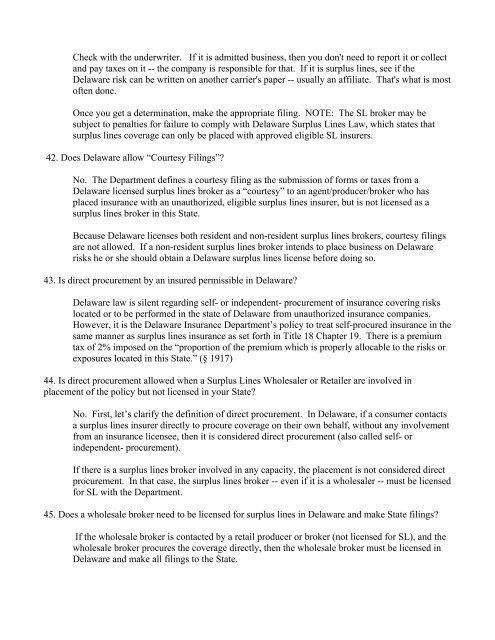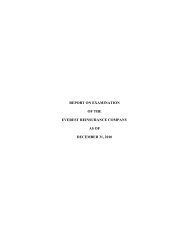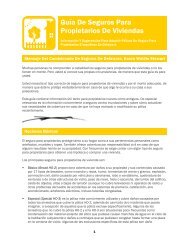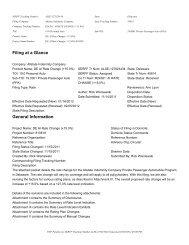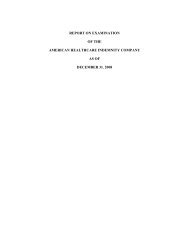SURPLUS LINES FAQ - Delaware Insurance Commissioner
SURPLUS LINES FAQ - Delaware Insurance Commissioner
SURPLUS LINES FAQ - Delaware Insurance Commissioner
You also want an ePaper? Increase the reach of your titles
YUMPU automatically turns print PDFs into web optimized ePapers that Google loves.
Check with the underwriter. If it is admitted business, then you don't need to report it or collect<br />
and pay taxes on it -- the company is responsible for that. If it is surplus lines, see if the<br />
<strong>Delaware</strong> risk can be written on another carrier's paper -- usually an affiliate. That's what is most<br />
often done.<br />
Once you get a determination, make the appropriate filing. NOTE: The SL broker may be<br />
subject to penalties for failure to comply with <strong>Delaware</strong> Surplus Lines Law, which states that<br />
surplus lines coverage can only be placed with approved eligible SL insurers.<br />
42. Does <strong>Delaware</strong> allow “Courtesy Filings”?<br />
No. The Department defines a courtesy filing as the submission of forms or taxes from a<br />
<strong>Delaware</strong> licensed surplus lines broker as a “courtesy” to an agent/producer/broker who has<br />
placed insurance with an unauthorized, eligible surplus lines insurer, but is not licensed as a<br />
surplus lines broker in this State.<br />
Because <strong>Delaware</strong> licenses both resident and non-resident surplus lines brokers, courtesy filings<br />
are not allowed. If a non-resident surplus lines broker intends to place business on <strong>Delaware</strong><br />
risks he or she should obtain a <strong>Delaware</strong> surplus lines license before doing so.<br />
43. Is direct procurement by an insured permissible in <strong>Delaware</strong>?<br />
<strong>Delaware</strong> law is silent regarding self- or independent- procurement of insurance covering risks<br />
located or to be performed in the state of <strong>Delaware</strong> from unauthorized insurance companies.<br />
However, it is the <strong>Delaware</strong> <strong>Insurance</strong> Department’s policy to treat self-procured insurance in the<br />
same manner as surplus lines insurance as set forth in Title 18 Chapter 19. There is a premium<br />
tax of 2% imposed on the “proportion of the premium which is properly allocable to the risks or<br />
exposures located in this State.” (§ 1917)<br />
44. Is direct procurement allowed when a Surplus Lines Wholesaler or Retailer are involved in<br />
placement of the policy but not licensed in your State?<br />
No. First, let’s clarify the definition of direct procurement. In <strong>Delaware</strong>, if a consumer contacts<br />
a surplus lines insurer directly to procure coverage on their own behalf, without any involvement<br />
from an insurance licensee, then it is considered direct procurement (also called self- or<br />
independent- procurement).<br />
If there is a surplus lines broker involved in any capacity, the placement is not considered direct<br />
procurement. In that case, the surplus lines broker -- even if it is a wholesaler -- must be licensed<br />
for SL with the Department.<br />
45. Does a wholesale broker need to be licensed for surplus lines in <strong>Delaware</strong> and make State filings?<br />
If the wholesale broker is contacted by a retail producer or broker (not licensed for SL), and the<br />
wholesale broker procures the coverage directly, then the wholesale broker must be licensed in<br />
<strong>Delaware</strong> and make all filings to the State.


